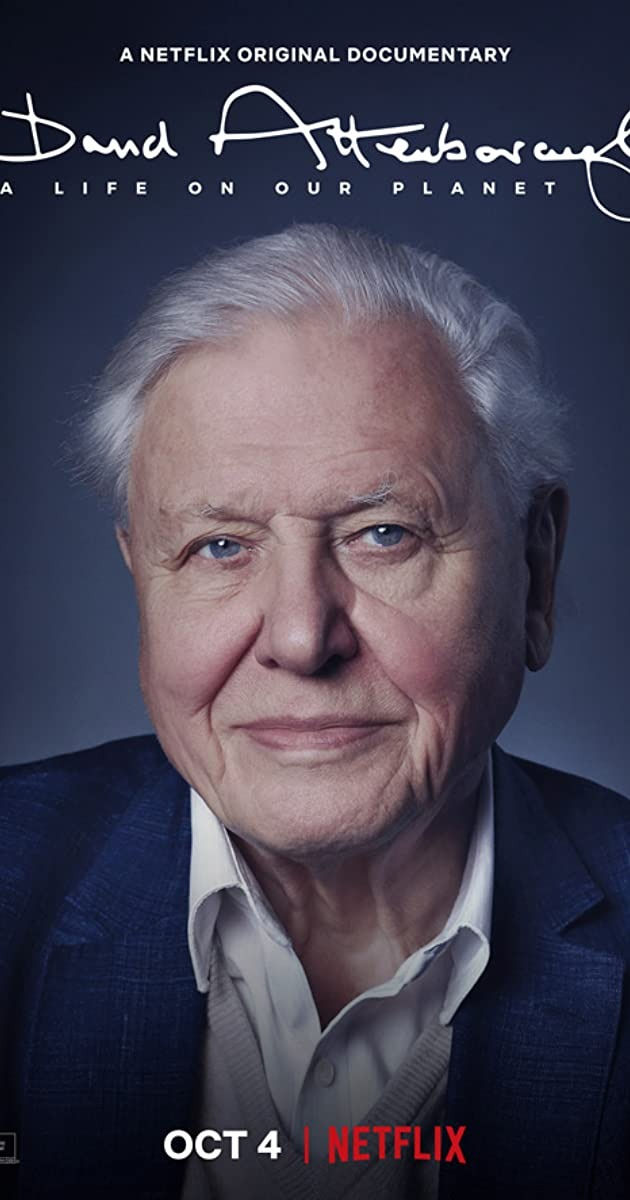David Attenborough: A Life on Our Planet – Netflix documentary review
- Amber Jackson
- Oct 29, 2020
- 3 min read
Directed by #JonathanHughes, #KeithScholey, #AlastairFothergill
Starring #DavidAttenborough
An environmental catastrophe and its impact across the globe is the centrepiece of David Attenborough’s latest documentary on Netflix, acting as a timeline for a swelling human population. Within just eighty-minutes, each chapter shows the diminishment and destruction of natural land, whilst appealing to the loss of biodiversity and how it is a continuing event like any other. The message? Earth has changed so rapidly in his lifetime, that we and future generations must seek to put man-made mistakes right.
This is David Attenborough’s witness statement.

Framing the narrative are panning shots of a crumbling Chernobyl, with Soviet imagery and decaying buildings pointing to a world lost. From the wreckage emerges Sir David himself, exploring a city lost to the mechanical destruction of human error. He explores how nature has reclaimed the space of what has been left behind and it is this framework that seeks to inform us that the world will continue without us regardless of our actions.
Historical depictions of the earth featured reflect a slow and steady evolutionary change before a catastrophic change provokes mass extinction, causing the earth to rebuild and create a new dominant species. We, the current dominant species, are creating change faster than the earth typically anticipates. Archival footage of Attenborough’s passionate journey across the globe emphasises just how much change has happened in his lifetime alone and how rapidly humans have carved into the earth.
This footage of Sir David and other environmentalists in the 60s and 70s places this documentary within a context of ‘naïve fascination’ – due to evolving understandings of the planet and its environment/s. It was awe-inspiring to see such change, particularly seeing earth from space for the first time. However, this meta understanding of humanity and, as Attenborough puts it, “watching ourselves watch the world go by,” ultimately led to humanity speeding up the process of discovery and destruction.
Amongst this informative backdrop, the cinematography of this piece is sensational. It reveals to us intimate captures of animals that are continuously threatened by human destruction. Their home is shown to be a beautiful colour-wheel of grass, leaves, buildings, snow and water. Classical music exists to exemplify this beauty. Our home is breath-taking and it is emotional to watch. Swooping shots portray a seemingly never-ending landscape in all its colourful glory, but also its tragedy. The camera simultaneously acts as the destroyer and the destroyed as the natural world is fading before our eyes and we, the spectator, feel powerless to stop it.
David Attenborough as always is the perfect narrator in that he appeals to our emotions through education, whilst urgently instructing us to pay attention. He reminds us of the cold reality that humanity is vulnerable and entirely dependent upon its natural surroundings. Within this film, we really do become witnesses through his eyes.
Sound is almost tactile, as we the viewer are surrounded by noises of nature so that we are up close and personal with every species. We are given breath-taking footage of the animals that humans kill and how these animals became personalities because of film and recording. This impact of film confirmed that they need protecting and so awareness continues to spread. Despite this greater knowledge, we still see wonderland become wasteland, the impact of human activity converting beautiful land and sea to skeletal graveyards.
These types of intimate sceneries are a common feature of Attenborough documentaries – except there is more of an urgency from him this time. His manner is frank and leaks desperation. His emotions appeal to our emotions. The sharing of scientific knowledge amongst this footage stresses the importance of a world and its ecosystems negatively changing beyond recognition.
“We must re-wild the world”
In the final thirty minutes of his appeal, Attenborough offers potential solutions to the problems that humanity has caused. He provides examples that appeal to socio-political issues that we may think extend beyond climate change – but they are all connected. David Attenborough calls for us to work with nature rather than against it, resulting in us saving ourselves.
A Life on Our Planet is arguably David Attenborough’s best documentary yet. It is a brutal introspective of what our world could become very soon. The scientific predictions of the coming decades are harrowing. Yet, there is an offering of hope. Attenborough attests that he will not be around to stop this change, but we and the coming generations may be able to inflict measures that alter the course of climate change as we recognise it.
I would recommend this Netflix documentary for everyone to watch – not least to gain a greater understanding of the planet we call home.
Watch the trailer here:
.png)
.png)



Comments